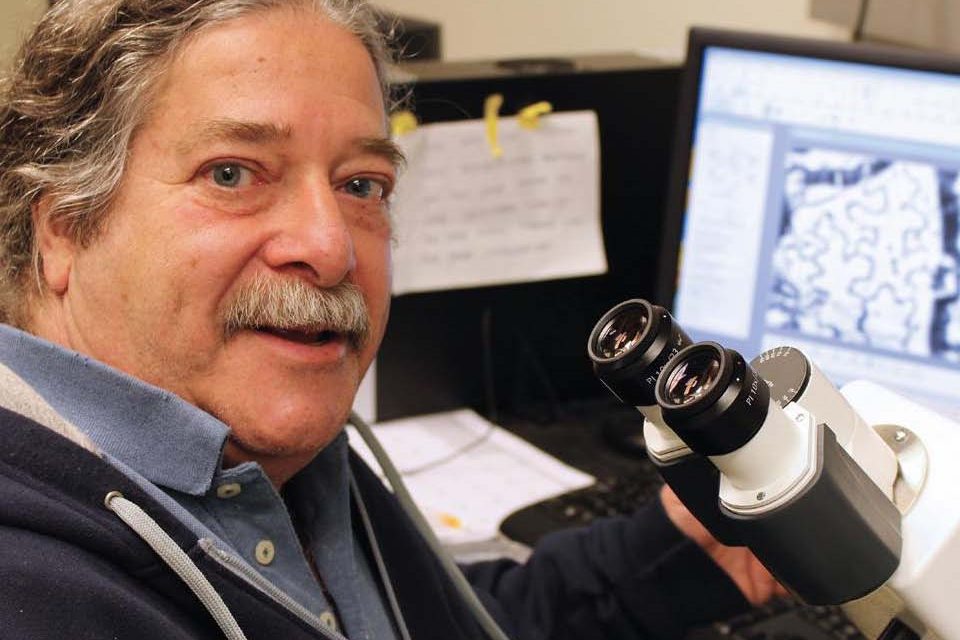Each morning, UConn alum Taylor Cheek, checks on the “babies” in her care. Food, water, and appropriate temperature are all within her responsibilities. But the babies Cheek cares for aren’t cherubic infants or curious toddlers. They’re seedlings of the cannabis plant and will someday be processed into medicinal marijuana.
Cheek earned her degree from UConn’s College of Agriculture, Health, and Natural Resources. Through training in traditional horticulture and an independent study focused specifically on cannabis, Cheek was hired as a lab technician at Connecticut Pharmaceutical Solutions, one of four authorized medical marijuana growing facilities in the state.
Soon more UConn students will have the opportunity to learn the science behind cannabis horticulture, thanks to a new undergraduate course being offered in the Department of Plant Science and Landscape Architecture.
One of the first courses of its kind in the country, “Horticulture of Cannabis: From Seed to Harvest” will be taught by Gerald “Gerry” Berkowitz, professor of plant science, and several experts working in the cannabis industry today, including former graduate student Matt DeBacco (CAHNR ’07, ’11 MS in plant pathology, ’14 MS in education). Other experts include CEOs from successful business operations, such as licensed cannabis growing facilities in Connecticut and cannabis testing labs.
Berkowitz says he developed the course in response to “tremendous student demand” for academic training related to the cannabis industry, which in 2015 Forbes called the best startup opportunity for entrepreneurs and investors.
“Our students see career opportunities and want to gain experience. Businesses need highly trained scientists to support the growth of this industry, and they are seeking talented graduates to enter this workforce,” says Berkowitz. “With this course, we can help both groups. It’s a win-win.”
UConn is among other colleges and universities exploring how to respond to growing interest in the cannabis industry, which is expected to have a total economic output of $40 billion and support 414,000 jobs across the country by 2021, according to a joint report by Arcview Market Research and BDS Analytics released in January 2018.
Northern Michigan University recently developed a four-year degree program in medicinal plant chemistry with the goal of preparing entrepreneurial students for careers in this emerging industry. Niagara College in Ontario, Canada offers a graduate certificate in Commercial Cannabis Production in response to what the college characterizes as an overwhelming need for trained professionals in the booming cannabis market. Several other U.S. universities, including the University of Vermont and the University of Colorado in Boulder, offer undergraduate classes focused on the business aspects or legality of cannabis.
However, comprehensive training in cannabis horticulture – the science behind actually growing an ideal crop – has historically been provided by non-accredited online outfits with amateur growers serving as faculty.
An internationally recognized plant scientist and dedicated educator, Berkowitz remarked a disconnect between the increased interest and acceptance of marijuana and cannabis research and the caliber of training options available to students.
“When you search for cannabis courses, you find websites for training schools that have no academic affiliations,” he says. “When you read about best practices for cannabis horticulture, you discover that the information provided isn’t substantiated by refereed science or subjected to rigorous review. That’s a problem.”
With a firm focus in horticulture, the UConn course serves as a gateway to the entire cannabis industry. The introductory course is open to all UConn students, regardless of their major, and has no prerequisites for enrollment. Along with Berkowitz, expert guest lecturers will present on topics like cannabis genetics, seed selection, soil and tissue testing, plant hormones, and lab testing of harvests, among others.
Berkowitz currently has the ability to work with low tetrahydrocannabinol (THC) hemp cannabis plants, which will be used as examples for class demonstrations. Unlike full-potency marijuana plants, the low THC hemp plants in Berkowitz’s lab don’t contain enough of the psychoactive component to give euphoric effects if ingested. The plants will be grown in concert with the course to provide students with hands-on examples of the range of horticultural methods applied to cannabis, such as propagating clones through cuttings, transplanting, training plants to alter canopy and flower architecture, culling males, pest management, and more.
This has been a long time coming for Berkowitz, who has taken on independent studies with students interested in the cannabis industry for several years. With an expected 100 students in the first year, he hopes the course grows in popularity and could pave the way for additional advanced level courses and even the possibility of a minor or a dedicated degree program.
“As laws have changed and acceptance for medical marijuana has grown, we’ve seen more and more interest and more and more opportunities for students and faculty alike to delve into the science of cannabis,” says Berkowitz. “UConn is making inroads on both the educational and research fronts to support our students, our science, and our state’s economy.”
As part of this inaugural class, Berkowitz plans to take his students on a field trip. Assuming all the paperwork goes through, they will have the chance to visit Connecticut Pharmaceutical Solutions, the facility where Berkowitz’s former student Taylor Cheek works. On that field trip, they’ll stop at the nursery and check in on Cheek and her “babies” to see how they’re all growing up.



